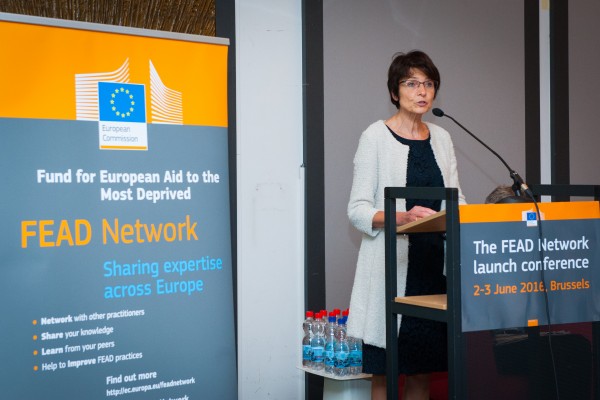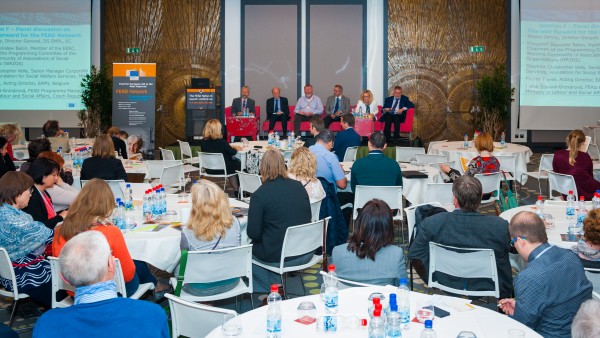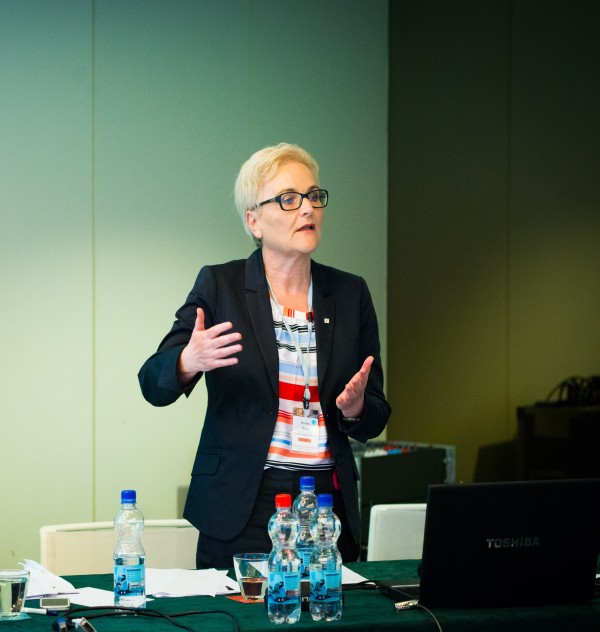FEAD Network Launch Conference
On 2 and 3 June, the first Fund for European Aid to the Most Deprived (FEAD) Network launch conference was held in Brussels with the theme "The Fead Network: sharing knowledge, finding synergies to break the vicious circle of poverty and deprivation". Over 200 participants representing implementing partners, managing authorities, NGOs and other national level stakeholders from EU Member States gathered to discuss ways to implement FEAD-funded programmes and services.
First established in 2014, FEAD assistance includes both material assistance such as food aid and non-material assistance like inclusion social inclusion support. As the fund is administered at the national level, it allows the authorities of participating countries to allocate FEAD funding to activities and projects that best cater to their country’s specific context and needs.
The conference commenced with an opening address by European Commissioner for Employment, Social Affairs and Inclusion Marianne Thyssen, who emphasised the important role that FEAD can play in helping the most vulnerable – including migrants that have recently arrived in Europe.

"Through the creation of FEAD in 2014, the European Union has provided an instrument that directly aims to break the vicious cycle of poverty and deprivation,” said Commissioner Thyssen.
During the event, speakers highlighted a clear need for FEAD assistance, given that 25% of the EU population is at risk of poverty and social exclusion, and 9% faces situations of material deprivation. Panellists emphasised that the fund serves as a tool to help lift people out of poverty and bring them back into the job market, underlining however, that FEAD alone cannot solve poverty in Europe today. In order for FEAD to be as effective as possible, attention needs to be placed on capacity building and the strengthening of relationships among the different groups involved with FEAD. The newly created FEAD online network can be used as a platform for sharing best practices, networking, and increasing opportunities for collaboration with colleagues throughout the EU.
Several National Red Cross Societies in the EU actively work as implementing partners to FEAD, including in countries like Austria, France, Croatia, Belgium, Luxembourg, Spain, Italy, Latvia and Estonia. During the panel on "Assistance to families and addressing child poverty,” Monika Wild - Head of Health and Social Services Department from the Austrian Red Cross presented their school starter parcels initiative.

This new initiative was piloted last year by the Austrian Ministry of Social Affairs, which chose the Austrian Red Cross as its sole FEAD implementing partner in the country. The programme, which will last for three years, has so far seen great success with a 69% uptake from qualifying families. The school starter parcels programme identifies qualifying families in need through a means tested minimum income scheme. The Austrian Red Cross sends out regional vouchers and application forms to qualifying households. Families then go to Red Cross branches and fill out the application with staff guidance. Based on their needs, families can choose from 19 different parcels, made up of book bags with a variety of stationary items. When they pick up their parcel one to two weeks later, families also receive an informative brochure with practical information such as how to manage their children’s cell phone bills. The school starter parcels programme provides families with material assistance that offsets some of the financial burden associated with school costs at the beginning of each academic year. The programme also supports the social inclusion of families through the practical advice given in the brochures, as well as helps foster a sense of belonging in the children because they have backpacks just like those of their peers at school.

Parcels Austrian Red Cross initiative. Photo: European Union
In France, the French Red Cross uses FEAD assistance to supply food products to approximately 700 Red Cross distribution points within the metropolitan and outer sea territories. Thanks to this supply chain, in 2015 the French Red Cross was able to distribute 22,826 tons of food throughout the country to 167,400 families (a total of 378,077 individuals). While food assistance is offered, the main emphasis of the French Red Cross is to encourage greater social inclusion for those in need. The food distribution areas act like entry points that enable the French Red Cross volunteers to meet the beneficiaries, as well as to introduce them to other French Red Cross activities like language classes, help finding a job, and parental advice. In Croatia, the Croatian Red Cross would like to use FEAD support to provide food assistance. This year, Croatia plans on implementing a programme that offers free school meals for elementary school students that come from families that are at risk of poverty. Their focus will be on reducing poverty by distributing food and / or basic material assistance.
FEAD has EUR 3.8 billion in funds allocated for the 2014-2020 period. Three regional FEAD conferences will be taking place before the end of the year for further follow up and discussion amongst stakeholders.
More information:
Learn more about FEAD in the EU.
Access the FEAD Online Network.
Read about the FEAD school starter packs in Austria (in German).
Learn about FEAD projects in France, in particular food aid (in French).
For media inquiries, please contact Eva Oyón on: eva.oyon@redcross.eu or +32 2 235 09 22

